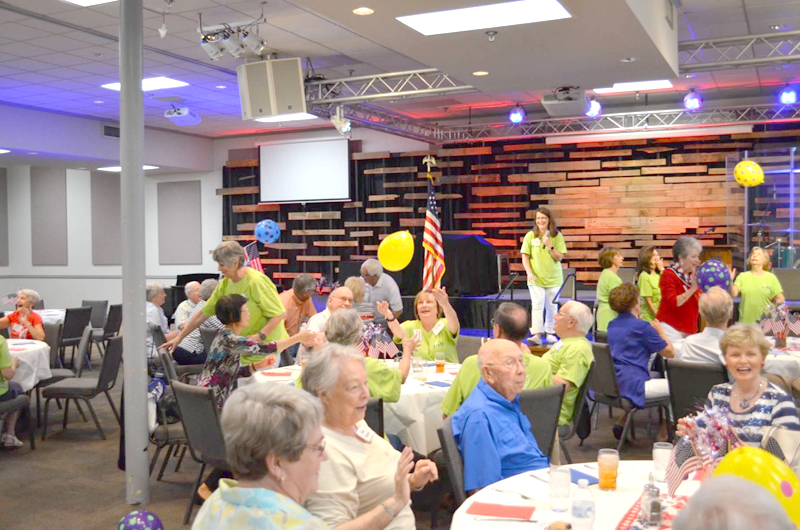By Morgan Bryce
Editor
Helping individuals living with dementia continue to find their purpose in life, as well as supporting their carepartners are two primary goals of REACH, a community respite ministry housed at Auburn United Methodist Church.
Established in summer 2016, REACH is a program supported by local churches and Auburn University’s nursing and social work programs. REACH co-founder Gerald Johnson said that the program has thrived under Executive Director Christine Browdy’s leadership, who has helped expand its overall program availability, participation, support group and volunteer assistance.
“We all have a purpose and we all want to know what that purpose is. Just because somebody diagnosed with dementia does not mean that that purpose goes away,” Browdy said. “Part of the reason why we do what we do at REACH is to help them continue to build on that purpose.”
Johnson said the idea behind starting REACH sprouted from his experience as a carepartner (non-professional caregiver) for his wife Nadine, who was diagnosed with dementia in 2012. Frequent trips back-and-forth to a similar respite care in Montgomery proved to be effective, as Nadine received “physical and mental exercise and socialization” which most medical experts agree is the best way to combat the disease’s progress. Others shared in Johnson’s struggle and agreed that the Auburn-Opelika area needed a similar program.
Originally meeting once a month, REACH members started meeting more frequently to accommodate the program’s growth and hired Browdy in December 2017 to help coordinate and lead those efforts.
Since her teenage years, Browdy has focused on a career working with the elderly, particularly dementia patients. Finishing her education with degrees in health administration and counseling, Browdy has worked with the senior population during her entire career, including several years with the Lee-Russell Council of Government’s Area Agency on Aging before joining the REACH program.
Currently, REACH offers two weekly classes for its program participants on Tuesdays and Thursdays from 10 a.m. to 2 p.m. Browdy, along with Johnson, Program Volunteer Blanche McElfresh and others, work closely in creating programs that offer both fun and proper mental and physical stimulation to participants.
A typical day will consist of art or painting time, board and spelling games, food and fellowship and sing-alongs to songs that are near and dear to participant’s hearts.
“When the day is over and we tell a carepartner or a loved one what a participant did in class that day, they’ll often say, ‘Wow, they could do that?’ That brings such a sense of joy to us volunteers because they may go home and try to do things that they didn’t think they could do,” McElfresh said.
“When I describe those times together to people outside of the REACH program, I always lead by using the word ‘fun.’ It’s hilarious and wonderful to see them enjoying themselves during the day,” Johnson added. “They just engage in everything and enjoy living in the moment.”
The program is open to anyone living with Alzheimer’s or other forms of dementia. Participants are required to be able to feed themselves, use the restroom on their own and function in social situations. The cost is $30 per session, but scholarships are available for those with financial needs.
On the first day of attending the program, loved ones or carepartners are required to accompany participants. Browdy said she carefully observes participants to help find the perfect volunteer match, many of whom come from all walks of life. For the duration of a participant’s time in the program, their assigned volunteer will work and be with them one-on-one during sessions.
Another crucial component of REACH is its aforementioned support group, which meets monthly and allows members to learn and share in each other’s experiences.
“A caregiver is an educated, trained person whereas a carepartner is someone who isn’t trained and needs continuing education as they take care of their loved one. It’s a time to learn but it’s also a time to talk to each other and it’s truly incredible to hear some of the stories,” Johnson said.
While dementia and its other forms are currently irreversible, Browdy said that they have been told many success stories about their participants and that many of the disease’s side effects have been reduced or muted as a result of activities they have enjoyed through REACH.
“I’ve heard from people that it helps them sleep better, because they’re tired at the end of the day. Also, they tend to be better at articulating their thoughts,” Browdy said. “However, it does tend to vary from person to person, but it’s always best if it’s caught and treated early. We can’t backtrack and regain what was lost, but a program like this, when attended regularly, helps slow down the disease and its progression.”
For more information or to schedule a meeting with Browdy, call 334-826-8800, ext. 252 or send email to christineb@aumc.net. Photos and videos from REACH sessions can be found on its Facebook page, “REACH Community Respite Ministry.” The church is located at 137 S. Gay St.

